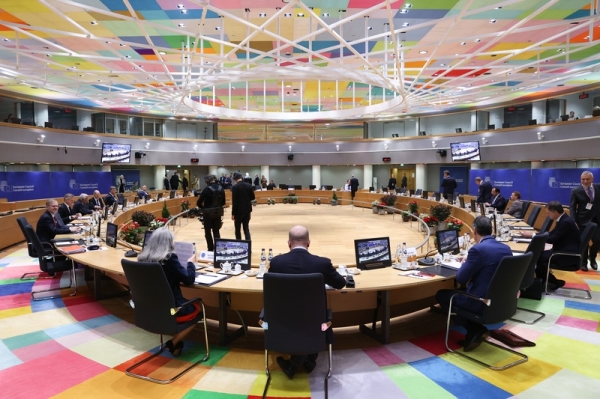EU leaders mull ways to arrest bloc’s economic decline
With Europe is falling behind the US and losing ground to China, talks between EU leaders at this week’s special European Council will focus mainly on Europe’s economic competitiveness in the global arena.
Before delving into economic competitiveness, EU heads of state and government will discuss foreign affairs during a dinner on Wednesday (17 April).
Ukrainian president Volodymyr Zelensky is set to join EU leaders via videoconference to discuss Kyiv’s air defence needs. But discussions will also focus on EU-Turkey relations and the Middle East.
Following Iran’s latest attack against Israel, EU leaders are expected to call all parties to prevent further regional escalation, especially in Lebanon. Simultaneously, talks on further sanctions on Iran’s missile and drone programmes are underway.
The EU27 are also expected to express the significant importance the bloc places on the resumption and progress of the Cyprus settlement talks.
After being sidelined by the numerous crises facing the 27-nation bloc in recent years, the issue of economic competitiveness will be the main focus of talks on Thursday (18 April).
"[It is] about going beyond national interests and accepting to do things together," an EU senior official said.
How to strengthen the EU’s single market, increase availability and access to capital, ensure an effective industrial policy, and foster research as well as innovation are the main questions on the table. Trade is also part of the equation.
This includes talks on state aid, corporate taxation and insolvency regimes. "We know it’s controversial," the official said.
Focus on capital markets union and supervision
But one of the big topics on the agenda will be how to make the Capital Markets Union — a decade-old project — a reality.
France wants the Paris-based European Securities and Markets Authority (ESMA), the current EU regulator, to be given direct oversight over clearing and trading houses and asset managers. But Germany is reluctant as it fears this could increase costs for banks and other financial actors.
"It is a fact that in the EU we have a fragmented market," an EU diplomat said, backing EU supervision of the Capital Markets Union.
EU leaders are expected to acknowledge the bloc’s vulnerabilities and call for policy adjustments, especially when it comes to long-term productivity and technological and demographic trends.
Over the next few years, it is projected that the EU’s portion of global GDP will decrease from 17.9 percent in 2021 to around 14.2 percent by 2040.
And, as the EU’s economic influence is expected to decrease, EU leaders will call for a "new European competitiveness deal" to close gaps in growth, productivity, and innovation.
This comes amid concerns over what some see as over-regulation and an excessive bureaucratic burden on companies — which has prompted some leaders to call for a regulatory pause.
In this context, some EU member states hope to see an industrial strategy focused on small and medium enterprises in 2025, coinciding with the start of the new EU commission.
On Thursday, former Italian prime minister Enrico Letta will present his report on the future of the single market to EU leaders.
’Wrong focus on competitiveness’
Letta is also expected to call for a strategy aimed at matching the impact of the US Inflation Reduction Act (IRA), with its $369bn in grants, loans and tax credits.
"We have to keep in mind that the role of SMEs today in the present single market is challenged ... for an SME it is not easy to work on 27 different frameworks," said Letta on Tuesday.
"This is why the ideas that I will put in the report will be to make working on the ‘27 levels’ easier," he added.
Letta’s insights will be complemented by Italian former premier Mario Draghi’s report on competitiveness.
"For a long time, competitiveness has been a contentious issue for Europe...The key issue is not that competitiveness is a flawed concept. It is that Europe has had the wrong focus," said Draghi during a conference on Tuesday.
"We didn’t see our external competitiveness as a serious policy question," he also said, arguing that without a strategy European industries will shut down capacity or relocate outside the EU where they face lower regulatory burden and in many cases massive subsidies.
Earlier this year, the former president of the European Central Bank said that green and digital transitions will require at least €500bn. But EU member states have also agreed to increase investment and ramp up defence production.
"Most of the investment gap will need to be covered by private investment," Draghi said, adding that advancing the capital markets union is a key part of the overall competitiveness strategy.

